|
Sheep milk: A pertinent functional food
Arpita Mohapatra, Ajay Kumar Shinde, Raghvendar Singh Abstract Modern human diet and changes in lifestyle are emerging as a challenge in developing countries resulting to endless ailments. Thus, in modern spectra of human health, bioactive foods play a pivotal role. Under the umbrella of food and nutrition security, functional dairy foods have become the need of the hour. Sheep milk is one of the functionally active dairy foods and it is also considered as nutritional powerhouse. The beneficial role of sheep milk results from its fatty acid, immunoglobulin and non-immune protein contents. In human gut, milk proteins turn into excellent source of bioactive peptides with antioxidative, antimicrobial, antihypertensive, immunomodulatory and antithrombotic role. It is also used in anti-ageing formulations and cosmetic soap preparations to soothe psoriasis and skin eczema like chronic conditions. The unique physicochemical and biochemical properties of sheep milk also include prebiotics and probiotics which make it perfect functional food for human health promotion and disease risk reduction. The milk from Indian sheep is relished by the shepherds and their households. They claim that it has many health benefits, but it is an untapped area by the Indian researchers. The major challenge in Indian prospect is non availability of dairy sheep breed, but their milk functional potential cannot be ignored. This review is focused on worldwide work done on sheep milk for its unique functional characteristics. Keywords Sheep milk; Milk composition; Functional food; Bioactive peptides READ MORE
0 Comments
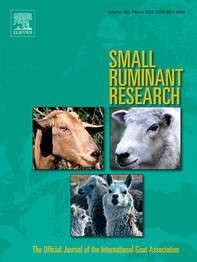 Contribution of small ruminants to food security for Ethiopian smallholder farmers Volume 184, March 2020, 106064 Hiwot Desta Wodajo, Biruk Alemu Gemeda, Wole Kinati, Annet Abenakyo Mulem, Anouka van Eerdewijk, Barbara Wieland Abstract This study investigates how and to what extent arguments related to food security influence preference of livestock species for women and men. Data was collected in four regions of Ethiopia through 92 focus group discussions (FGD) in communities where small ruminant production is common, Using a gender sensitive study designs, 23 FGDs were held separately with men, women and youth (male and female), and through a household survey involving 217 male and 212 women. Qualitative analysis was conducted to extract reasons given to explain the importance of livestock. Reasons related to food security were mapped to the four dimensions underpinning food security—accessibility, availability, nutritional value and stability. All FGDs considered sheep the most important livestock species, followed by cattle, with women allocating higher scores to sheep than men. All four dimensions of food security came up in statements explaining the importance of species but with variations across species. Interestingly, food security related arguments were most prevalent for goats followed by poultry. Of reasons given by women concerning the importance of goats, 78 % were related to food security with all four dimensions represented, and 52 % for poultry with two dimensions (availability and nutritional value). Answers from men especially had a stronger focus on economic reasons directly linked to income generation. Nevertheless, 64 % of men’s arguments for goats were related to food security. For sheep however, women only scored higher for arguments related to availability. When investigating purpose of small ruminant production at household level through a household survey, the importance of small ruminants for food security were confirmed; however, gender differences were less apparent. Being able to sell animals at short notice was the main reason for keeping small ruminants for both women and men followed by meat and milk for home consumption. Women’s argument for prioritizing selling were accessibility. For men, key arguments for selling were related to availability. For meat and milk their nutritional value was an important argument. Comparing agroecologies, accessibility (selling) was ranked top in highland areas and nutritional value (milk) was most important in lowland areas. In conclusion, this study provides much needed evidence on how small ruminants contribute to different dimensions of food security and are promising entry points targeting women to improve food and nutritional security by providing adequate animal source foods in a household. To read the entire article, visit SRR Small Ruminant Consultant wanted by ILRI in Ethiopia to develop "Integrated herd health intervention (i.e., vaccination, deworming, treatment and awareness creation campaigns) to reduce the impact of small ruminants’ diseases" The Position: The International Livestock Research Institute (ILRI) is looking to hire a Consultant in Animal and Human Health program.
General: The International Livestock Research Institute (ILRI) works to improve food and nutritional security and reduce poverty in developing countries through research for efficient, safe and sustainable use of livestock. It is the only one of 15 CGIAR research centers dedicated entirely to animal agriculture research for the developing world. Co-hosted by Kenya and Ethiopia, it has regional or country offices and projects in East, South and Southeast Asia as well as Central, East, Southern and West Africa. www.ilri.org. Background: Integrated herd health intervention (i.e., vaccination, deworming, treatment and awareness creation campaigns) is preferable to reduce the impact of small ruminants’ diseases since fragmented individual interventions of animal health challenges may not be able to generate sufficient benefits to increase production and productivity. On the other hand, dealing with individual problems might have a small impact, or the impacts might not last long and could also be more expensive to implement. It is known that when farmers participate in defining approaches toward the control and prevention of small ruminant diseases, the results are directly applicable to their own experience and lead to significant improvements in productivity and promote lasting behavior change. The activities in this project focus on small holder farmers who use communal grazing lands and are intended to be undertaken with full engagement of farmers and other stakeholders with a vision to ensure that interventions continue beyond the duration of the project. The project is being implemented in four small ruminants value chain sites: Menz, Bonga, Doyogena and Sekota – Abergelle. Agitu Ideo Gudeta, who was killed on Wednesday, used abandoned land to start a goat farming project employing migrants and refugees. To learn more about her life visit the links below. iga-goatworld.com
Ayele Abebe, Debre Berhan Agricultural Research Center SmaRT Ethiopia workshop and field day on Small Ruminant Community Based Breeding Program (CBBP) Hosaena, Ethiopia, 27–28 March 2018 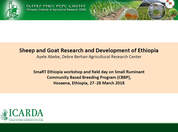 Outline for the national sheep and goat research
Feeding this huge population sustainably could be a great challenge for the nation!! READ MORE… 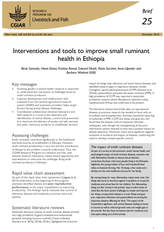 Key messages
READ THE FULL BRIEF Yogurt has deep roots in Ethiopia, particularly for pastoral communities, and now its handling is facing deep scrutiny from a research team at Addis Ababa University (AAU). Led by Dr. Kebede Amenu, the team is using bacterial counts to compare the safety of yogurt stored in aluminum containers versus traditional yogurt containers that women treat with a smoking process for sanitation. The team carried out a lab-based experiment to assess the effect of smoking of containers using different tree species on the microbial load of milk and yogurt kept in smoked containers. Building its case, the milk safety project collected milk and feces from 217 cows and camels in May and completed microbiological analysis for E.coli O157 and Salmonella. Comparing the results of this analysis to that on microbes present in the containers will help to determine the efficiency of the sanitation process. Ultimately, Dr. Amenu hopes to improve the sanitation of dairy products in remote parts of Ethiopia. The project, as summarized in this blog post, supports women and families to overcome food insecurity. It also funds three master’s students.
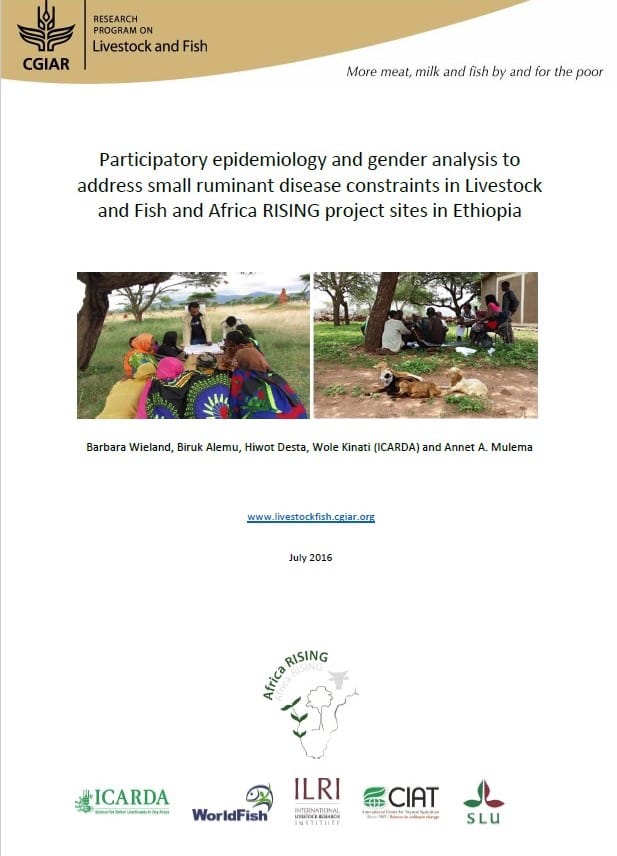 Summary Animal diseases continue to constrain livestock productivity, agricultural development, human wellbeing and poverty alleviation in many regions of the developing world. In Ethiopia this is not only true for Livestock and Fish and Africa RISING project sites, but has been mentioned in sites of different project or programs where ILRI has been involved. This participatory epidemiology and gender survey was conducted to better understand what these main livestock disease constraints are, how they affect different household, and how much men and women farmers know about their transmission. The findings of the study will also assist in defining future research related to small ruminant diseases, their economic impacts and gender issues related with animal diseases. Moreover, it also established gendered baseline data to monitor impact of future animal health interventions in small ruminants. Presented by Barbara Rischkowsky (ICARDA) at the Workshop on ICARDA-ILRI Training on Tools for Benchmarking Sheep and Goat Value Chains in Ethiopia, Addis Ababa, 6-9 November 2013.
|
IGA Blog
The International Goat Association promotes goat research and development for the benefit of humankind, to alleviate poverty, to promote prosperity and to improve the quality of life. Archives
May 2024
Categories
All
|
|
International Goat Association
2516 Millbrook Rd., Little Rock, AR72227 USA email: [email protected] -454-1641 |
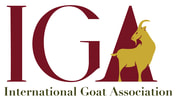
 RSS Feed
RSS Feed